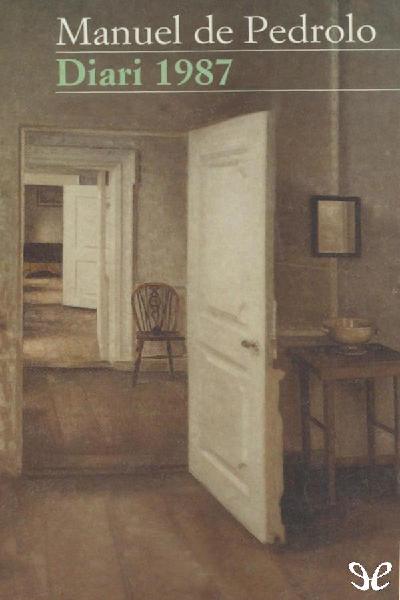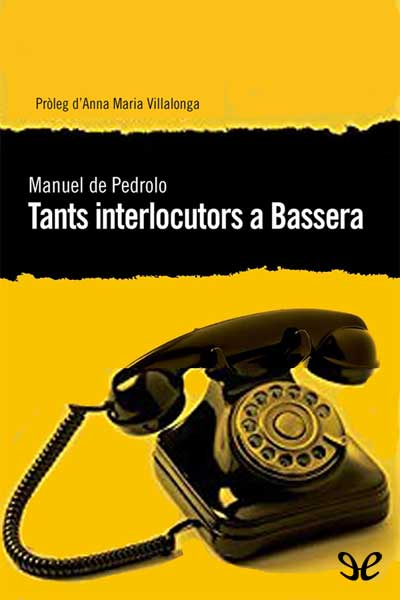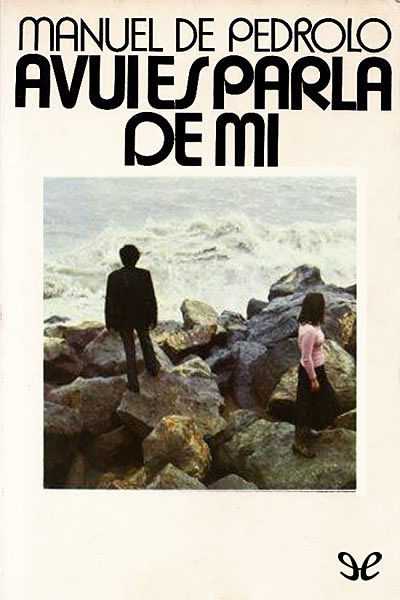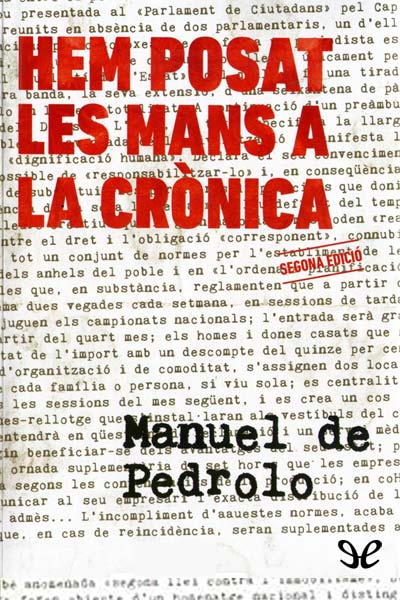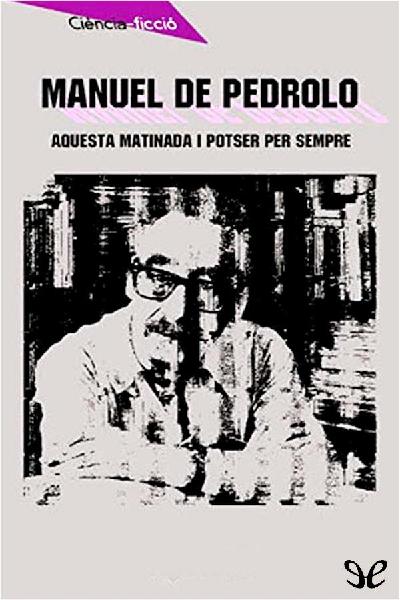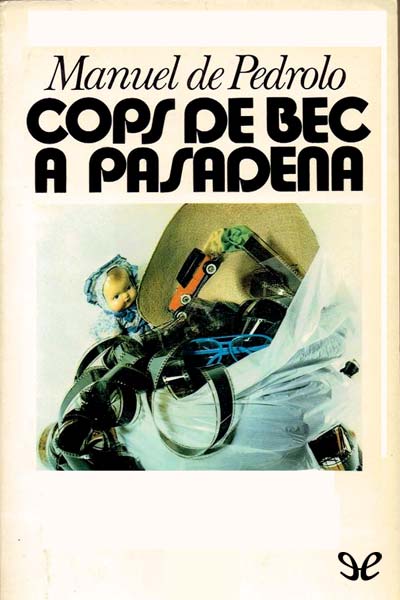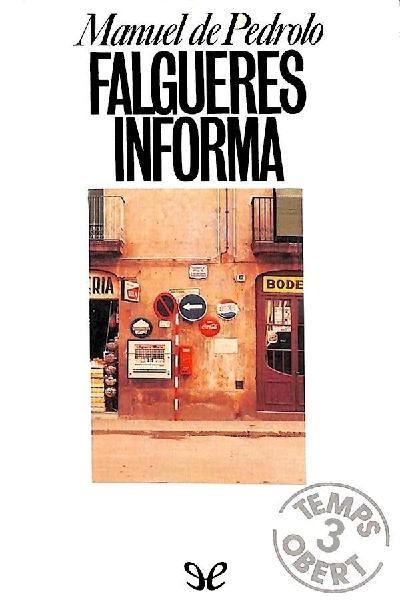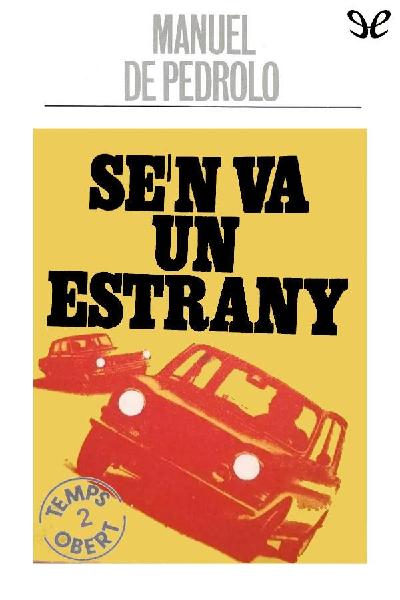oleebook.com
Des duns ulls de dona de Manuel de Pedrolo
de Manuel de Pedrolo - Género: Drama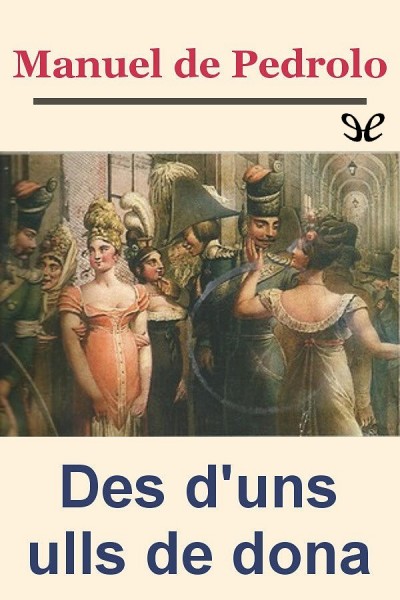
Sinopsis
La dona del protagonista Daniel Bastida, Teresina Faidella, filla dun antic membre del POUM que morí a Guadalajara, reconstrueix la vida que ha dut amb en Daniel a partir de ladolescència, quan ella treballava de dependenta en una bacallaneria i el seu festejador no era encara lhome dempresa destinat a convertir-se en escàpol de la justícia.
En Des duns ulls de dona, novel·la que, estilísticament, completa uns procediments narratius interessats en els mecanismes de retrospecció, Daniel ha sucumbit a lesquer dun món que ofereix el benestar material, àdhuc la riquesa, a canvi duna dimissió humana. A través de les motivacions del seu present, que provoquen levocació del passat comú, una Teresina adúltera integra aquest pretèrit i el temps actual en una unitat objectiva que presenta actituds insolidàries i, al capdavall, prou carnisseres per a fer víctimes. Entre elles, el mateix responsable-irresponsable.
Libros Recomendados - Relacionados
Reseñas Varias sobre este libro
EDIT: Ne, Gudridsu, ne znam kako ti je polo za rukom da mi obrie daleko najpopularniji teksti?, a da ostavi lajkove i komentare, a i ne elim da znam. Evo ga opet, dok mi ga opet ne obrie, a to se mene ti?e preispita?u malo ovaj stokholmski sindrom vezanosti za drutvenu mreu jer je ovo brisanje prikaza uz ukidanje opcije da sami dodajemo knjige stvarno poslednja kap.
***
Ne volim kad knjizi pri?em sa velikim o?ekivanjima jer se svidela raznim ljudima ?ije miljenje cenim pa se razo?aram. Uvek se pitam da li bi bilo bolje da sam ula na nevi?eno.
Uhvati zeca ima jednu jaku stranu, a to je struktura koju je Lana Bastai? po sopstvenom iskazu preuzela od Dojsa tj. svako poglavlje odgovara drugom poglavlju odabranog interteksta, ovde Kerolove Alise, i ima to jasnije to skrivenije reference na njega. Istovremeno i povrinska struktura funkcionie dobro u naizmeni?nim sadanjost/prolost poglavljima. I prstenasto zatvorena zavrna-po?etna re?enica je preuzeta od Dojsa i odli?no funkcionie. Odnos pripoveda?ica-najbolja drugarica-brat najbolje drugarice vrlo dobro hvata dinamiku tih mladala?kih druenja u kojima se stapaju razna protivre?na i latentna ose?anja i tenje a jo mnogo vie toga projektuje na drugu osobu, sve dok vie niste u stanju da je istinski vidite.
I... to je to o stvarima koje dobro funkcioniu, ako mene pitate. Uhvati zeca ima ozbiljne probleme s motivacijom likova i upotrebom simbola koje ne mogu da otpiem samo zato to eto nije u pitanju stvarnosna proza. Recimo, u prvoj polovini pripoveda?ica krene da se vozi Bosnom i odjednom padne mrak u tri popodne i ostane tako sve do izlaska iz Bosne. Mrak vide i drugi, dakle objektivno postoji, svuda je takav (samo je u Banjaluci crnji), eto nama magi?nog realizma... samo to do kraja knjige on ne dobije nikakvu drugu funkciju u okviru zapleta ni na koji na?in ne uti?e na prikazani svet, ostaje samo jeftini prvoloptaki znak da je Bosna tamni vilajet i da u njoj vlada MRAK ako niste znali. To ne valja. Sli?an prvoloptaki pristup primetan je, recimo, i u oblikovanju lika majke. Ne volim kad me lupaju po glavi simboli?nim scenama tipa: onda je mama isekla moju papirnu lutku jer joj se nije dopalo kako predstavljam sebe nedovoljno enstveno pa je napravila drugu, roze i sa ljokicama. Tako?e ne volim kad je presudna crta u karakterizaciji negativnog enskog lika (te iste majke) to to je neverovatno debeo i sve deblji i na kraju postane karikaturalno debelo ?udovite koje se oglaava replikama Kraljice Srce.
I tako dalje. Dovoljno sam kukala za vreme ?itanja o tome kako nekome ko je otpri junakinjinih godina ili stariji moe da smeta komotna tvrdnja da dete ro?eno na dan Titove smrti u prvom osnovne ne zna ko je Tito, ovde bih samo da pomenem kako ta simboli?ka upotreba 4. maja 1980. ima ve? ozbiljan sta u eks-ju umetnosti (npr. filmovi Autsajder i Rane, roman Pono? u njenim rukama, znam da ih ima jo samo ne mogu da se setim) i da uglavnom izaziva instant prevrtanje o?ima i ne tako blagu iritaciju.
Da, Lana Bastai? ima talenta, da, ovo je ambiciozna knjiga, ne, ni izdaleka nije savrena, vide?emo da li ?e idu?e biti manje pokvarene tenjom da se sve nacrta i onima to spavaju u poslednjoj klupi.
125 s Fran702 825
"Writers are cartographers of inner worlds...literature is there precisely as a means of questioning our idea of what is real...whether this reality is the same for both you and I."
-Lana Bastasic (Interview in Libartes Magazine)
"For me, the Balkans are a color...A sad brown that goes on meandering a dead river after an apocalypse...Hundreds of boots over the beaten earth...". "I could see her there...glancing condescendingly at my Dublin phase...she wouldn't even say anything; she would take Europe off me with her eyes...shamelessly revealing my Balkan scars...Home was not Bosnia. Bosnia was not home."
"Memories might be a frozen lake to me...but every now and then there's a crack in the surface and I can put my hand through it and catch a detail, a recollection...I have done my best not to remember for twelve years. And it worked...then I answered the phone and said her name." After a falling out and twelve long, silent years between two former best friends, Sara received a call from Lejla. "Armin is in Vienna." Sara was expected to drop everything, leave Dublin, and take a road trip with Lejla, a drive through the Bosnian countryside to Vienna. During wartime Bosnia, Lejla's older brother Armin had disappeared. With hopes of seeing Armin, after twenty years, Sara agreed.
"When Lejla showed up...everything froze." "I was stuck between two Lejla's- the one I had known my whole life...and this stranger with bleached hair and slutty clothes." As the road trip unfolded, two childhood friends shared their memories. Do fragmented memories lie? If so, whose truth is to be believed? Memories of birthday parties, prom night, a white rabbit and what happened on the island come to the forefront. Sara would go down the rabbit hole , a confusing, disorienting, dark place she was loath to revisit.
"Catch the Rabbit" by Lana Bastasic introduces the reader to the narrator, Sara. Growing up in a Serbian family with a father as police chief, Sara's childhood was easier than Lejla's. Lejla's family life was shaped by identity politics. She spent more time at home after Armin's disappearance, confined by her fearful mother. Bastasic's prose is exquisite. Sara and Lejla, their memories and complicated friendship is masterfully revealed. This novel is a classic in the making! Highly recommended!
Thank you Restless Books via Edelweiss for the ARC in exchange for an honest review.101 s Marko K.139 162
Moram priznati da pre ovog romana nisam ?uo za Lanu. Sude?i po koricama ovog romana, Lana ima 32 godine i ro?ena je u Zagrebu. Iza sebe ima dve zbirke pri?a, jednu zbirku poezije, i jedan roman za decu. Svako od ovih izdanja krunisan je nekom nagradom, tako da je ona dobitnica nagrada kao to su Zija Dizdarevi?, Ulaznica i Karver. Uhvati zeca je njen prvi roman za odrasle, i moram da priznam, iako ima i pozitivnih i malo manje pozitivnih elemenata, zaista je odli?an roman prvenac. Ona trenutno ivi u Barseloni gde ure?uje jedan knjievni ?asopis i vodi kolu knjievnosti.
Junakinja ovog romana, kao i pripoveda? je mlada devojka Sara, koja trenutno ivi u Dablinu sa svojim izabranikom. Sara u Dablinu vodi jedan normalan ivot, potpuno druga?iji od onog koji je vodila na Balkanu. Me?utim, jedne ve?eri, dobija telefonski poziv od Lejle, njene stare najbolje prijateljice sa kojom se nije videla niti ?ula 12 godina. Lejla stupa u kontakt sa Sarom kako bi je zamolila da do?e po nju u Mostar i da zajedno, iz nekog razloga, odu u Be?. Naravno, kako to i uvek biva sa starim, slomljenim prijateljstvima, Sara ba i nije rada da to u?ini, me?utim kada ?uje re?enicu Saro, Armin je u Be?u, stvar se apsolutno menja. Ko je Armin, zato je on bitan kao i razlog zbog kog Sara nakon svega kupuje kartu za Sarajevo, ostavlja apsolutno sve to ima i u roku od nekoliko sati odlazi u Mostar po Lejlu, ne?u otkrivati.
Ceo roman je ispri?an iz Sarine perspektive, i svako poglavlje se moe podeliti na dva dela. Naime, prvi deo svakog poglavlja smeten je u sadanjost, i pratimo Sarin odlazak u svoje rodno mesto, njen ponovni susret sa starom prijateljicom, dok nas drugi deo svakog poglavlja vra?a u njihovu prolost i detaljnije opisuje njihov odnos pre vie od jedne decenije. Iz ovih poglavlja nam je apsolutno jasno da su Sara i Lejla dve potpuno druga?ije individue, sa druga?ijim miljenjima i druga?ijim ablonom ponaanja, i automatski nam je jasno da je cilj ovog romana da istrai do koje mere suprotnosti mogu da obitavaju zajedno u miru. Druga stvar koju roman istrauje je prijateljstvo ne samo dve razli?ite osobe, ve? ene. ene koje su delile svoj prvi seks i prvu menstruaciju, a opet odrasle na dva potpuno druga?ija na?ina koja su ih na kraju definisala kao osobe.
Lanina proza je zaista specifi?na, i nije ni ?udo to je imenovana jugoslovenskom Elenom Ferante. Re?enice u ovom romanu su izuzetno poetske i to na jedan vrlo nenametljiv na?in, potpuno prirodan i liri?ki. ?itanje pri?e koju Sara pripoveda je stvarno jedno iskustvo. Kada na sve to dodamo sudar dva Balkana, dve Jugoslavije, odnosno one predratne i dananje dobijamo jedan mozaik svakakvih emocija. Bosna u romanu ima jednu izuzetno bitnu ulogu, koja na jedan na?in slui kao spona izme?u Hrvatske i Srbije, jer se ?ini da je radnja smetena na jednu neutralnu teritoriju, a opet, s druge strane, Bosna je ta gde ta?no moemo da vidimo razliku izme?u katolika, pravoslavaca i muslimana, kao i sve ono to je rat sa sobom doneo i ostavio.
Ukoliko okrenete na pozadinu ove knjige, shvati?ete da je Alisa u Zemlji ?uda jedna bitna metafora. Odnosno, zec u naslovu romana je jedan jak simbol prijateljstva Sare i Lejle, i ceo metafori?ki i simboli?ki momenat ove knjige je spektakularno odra?en, i mnogo mi je drago to imamo nekog mladog pisca sa ovih prostora ko to ume i zna da uradi.
Iako je roman zaista jedno posebno iskustvo i neto druga?ije jer je u sreditu moderna Bosna koja prepli?e sadanje vreme kao i ono predratno, vidi se da je ovo Lanin roman prvenac. Naime, odnos Sare i Lejle je na momente opisan na jedan vrlo ?udan na?in, gde ne moemo da se poistovetimo ni sa jednim likom niti da razumemo apsolutno sve njihove izbore. Tako?e, s obzirom na to da su poglavlja pisana kao Sarina obra?anja Lejli, malo je neprirodno da do najsitnijih detalja opisuje neto ?ega bi se Lejka, kako bi trebalo, se?ala. ?ini se da su neke emocije malo usiljene, ali postoji mogu?nost da je to samo neka moja li?na duboka analiza.
Zaklju?ak
Sve u svemu, Uhvati zeca je moda najbolji debitantski roman sa ovih prostora ove godine. Lanin jezik je odli?an, simbolizam u romanu tako?e za svaku pohvalu, a li?no smatram da je dobar simbolizam izuzetno bitan za knjigu. Kada na sve to dodamo Jugoslaviju kupljen sam. Ovaj roman ne da preporu?ujem svima, nego smatram da, ?itali ili ne, trebalo bi da ga kupite i imate kod sebe. Ne samo zato to ?ete podrati Lanu Bastai? kao nekoga ko ima potencijala za spektakularne stvari u knjievnosti, ve? zato to moete sebi dati ansu da pro?itate ovaj roman, u kom ?ete stvarno uivati.59 s Jola184 362
Picture The Neapolitan Novels by Elena Ferrante, set in former Yugoslavia, Bosnia, Croatia, Ireland and Austria in the nineties and nowadays, but shortened to 272 pages, partly turned into a road novel, more intense, more emotional, a bit heavy-handed, sometimes disturbing, with a recurring symbol of a rabbit/hare popping out from time to time, and you will get a gist of my experience with Catch the Rabbit (2018) by a Croatian author, Lana Bastai?.
I do not know if the similarities to Ferrante's series were coincidental, subconscious or intended but they are a fact which kept bothering me a bit and sometimes I felt rolling my eyes, exactly Lejla, one of the two protagonists, who used to do it quite often. The disappearance of a family member, the change of name, both enriching and destructive female friendship with a drop of erotic fascination, spread over many years, the dynamics of this relationship: I would always be lagging behind you in search of some sort of grownup, intangible knowledge, while you were already disappearing into the distance. The desperate efforts to depict a complex, hypnotizing personality: Facing her, all words are miserably colorblind, despite the literary talent, ambitions and career of the narrator. Even the name of one of the two main characters, Lejla/Lela, was almost twin similar to Ferrante's Lila.
I found Catch the Rabbit uneven which frustrated me because the elements I loved kept whetting my appetite. It caused my reactions to sway between awe and chagrin. The things that especially appealed to me were the nervous pace of the narration flow and the denouement in front of Young Hare by Albrecht Dürer in Albertina Modern Museum in Vienna. The ending definitely worked for me. Another element that appealed to me was the circular composition of the novel, with the motto from Alice in Wonderland featuring a rabbit at the beginning and Dürer's painting at the end. Besides, I admire the way Sara and Leja's story is interspersed among tragic historical facts.
As for the things that I did not particularly enjoy, I think Lana Bastai? got slightly carried away portraying Lejla as an appalling energetic vampire. The blood, which appears in one of the scenes, intensifies this vampiric association, albeit the novel is 100% realistic. Lejla is so preposterous, selfish and sickening that it makes embracing Sara's fascination a challenge, even taking into account the fact that she might have had a tendency to engage in venomously toxic relationships. Nevertheless, Sara's portrayal is tantalizing. I wish a few subplot characters were more nuanced and multifaceted too, for example, the maths and biology teachers or Sara's father. They would have benefited from it greatly.
I was truly impressed when I found out that the author herself translated Catch the Rabbit into English. As for Bastai?'s writing style, I d it a lot at first but after a while got a little overwhelmed with surprising similes which seem to be the author's trademark:
Mostar glimmered, a polished jug, though the day was inexplicably gloomy.
They spread across the Old Bridge a wreath of plastic flowers on an important grave.
All of a sudden words seemed false, expired, stiff dry makeup on an old womans face.
They are fascinating but I found their frequency (sometimes even two on one page) rather extensive. The second half of the novel was much better in this respect. I loved the frozen lake metaphor though and will always remember Sara walking on ice in search of Lejla and lost time: Memories might be a frozen lake to me blurry and slippery but every now and then theres a crack in its surface and I can put my hand through it and catch a detail, a recollection in the cold water. But frozen lakes are vicious. Sometimes you catch a fish, other times you fall through and drown.
Young Hare, a 1502 watercolour and bodycolour painting by Albrecht Dürer.austria bosnia croatia ...more55 s1 comment TeresaAuthor 8 books960
The blurb on the cover describes this novel as Lewis Carroll meets Elena Ferrante in a Balkanized Wonderland. Thats a fair assessment, especially in regards to its Ferrante comparison: a condensed The Neapolitan Novels set in Dublin, Bosnia, and Vienna, with one of its themes being language(s)this author is also her books translator. The name of the narrators friend is Lejla/Lela, similar to Ferrantes Lila. A name change (Ferrante also employs a new name) is central to the background story of the two friends growing up in Bosnia of the 90s. If the blurb hadnt told me so, I still wouldve picked up on the Ferrante similarities. Theres no so-called magical realism a la Alice's Adventures in Wonderland, though more than a few images evoke the Carroll classic as the two women go down a rabbit hole.*
Theres no denying this is a familiar story, one of a childhood friendship that is both destructive and has lasting effects into adulthood. It leaves its marks on the obsessive narrator who doesnt always see clearly. I get impatient with a story whose character cant get loose from the spell of another if I cant see the attraction and there was a bit of that for me here.
The first-person narrator/writer at times identifies so closely with her estranged friend she seems to want to be her. But that could be viewed as a metafictional trick of any writer who needs to inhabit her character in order to write about her. At the point I was starting to be impatient, the story veered, got more interesting, and ended with my thinking of another novel, The Goldfinch. To say which painting this novel makes use of would be to give away a pleasure of the ending.
This is the June pick of The Nervous Breakdown Book Club and Im glad it came my way.
*
Added 6/17: Yesterday I listened to an interview with the author: https://otherppl.com/lana-bastasic-in... In it she said her novel's framework purposely took the 12-chapter structure of Alice's Adventures in Wonderland, which I didn't pick up on at all; it's been a long time since I read Alice.48 s Vanja unjar ?ankovi?313 120
Dalo bi se o ovom romanu ba mnogo pisati jer je prili?no kvalitetan, ozbiljan i slojevit i Lana pie besprekorno. Me?utim, isto tako nisam potpuno o?arana i mogla bih ovome na?i i mnogo zamjerki. U svakom slu?aju, detaljnu analizu ?u ostaviti struci jer znam da imaju razloga da pohvale mnoge elemente vrijedne isticanja.
Mene je oduevio Lanin stil, njena na?itanost i obrazovanost, dubina, nesumnjiva knjievna vrijednost romana i prvenstveno sva zastupljena pore?enja, ali me je kraj mnogo razo?arao i naljutio, ne volim simboliku i ostala sam uskra?ena finala. Tako?e, roman obiluje negativnostima, kao da su se sve rune stvari ovog svijeta naselile na tle ovog nesre?nog i otunog usuda.
Negdje mi se ?ini kao da je Lana u ovaj roman htjela saeti sva svoja iskustva, kao da vie nikad ne?e pisati, pa ?e sad sve i teme i razmiljanja i uspomene i jezi?ke formulacije, pogotovo metafore objediniti u jednom djelu. Pomalo nadobudan ton tako?e ne ide u prilog mom bezrezervnom oduevljenju. Dakle, da je umjetni?ki kvalitetno i na nivou jeste (ako izuzmemo neka jezi?ka rjeenja koja paraju ui), tematikom, naalost, ne po mom ukusu.
Tako?e, treba ista?i da je Lana savreno do?arala stanje svijesti i sve to proivljavaju junakinje romana. Uvijek se divim piscima koji umiju tako vjerno i autenti?no prenijeti razmiljanja, emocije, pa i na?in izraavanja nekog u odre?enoj ivotnoj dobi, pogotovo onoj ranijoj, u kojoj vie sami nisu. Ba se mogu?e poistovjetiti s likovima i nekim njihovim iskustvima. Vrlo realisti?no, ali istovremeno mnogo skrivenih zna?enja koja obi?nom ?itaocu, pogotovo na prvo ?itanje, ostaju skrivena i nejasna. Dakle, ne o?ekujte lagano tivo iako autorka lako uvodi u pri?u koja te?e.
Sa zadovoljstvom sam se vra?ala na pojedine pasuse, re?enice, sintagme i to najvie iz onog prostog ?itala?kog uitka ne bih li eventualno i memorisala brojne prelijepe re?enice, a povremeno i ne bih li pokuala otkriti dublja zna?enja kojih zaista ima na pretek. Nije ovo nimalo naivno tivo, a Lanina izbruena vjetina pripovjedanja je zadivljuju?a. Svakako knjiga vrijedna panje.38 s Saa Stanii?Author 26 books1,644
Lässig und freundlich und mystisch und reich.36 s Dawn 191 32
This is one of the last books I read in 2020 and also one of the best. The writing itself is amazing (with the English translation done by the author herself); a book with hardly a wasted word makes quite an intense read.
The protagonist is Sara, a young woman born in Bosnia, now living in Dublin with her boyfriend. It becomes clear she has worked hard to disassociate and distance herself from all things Bosnia. Out of the blue, her best friend from childhood, Lejla, (who she hasnt spoken to for 12 yrs) calls asking Sara to drive her from Mostar to Vienna. Although they have not communicated for years, there is still a final link between them of childhood trauma Lejla had an older brother who disappeared during the Bosnian war when the girls were 11/12yo. Lejla tells Sara her brother is in Vienna, and so she goes to her.
As they wind their way across the countries, each chapter is split in two - the first half shows the present, the second recounts an event from their shared past. It becomes clear they do not always remember things the same way but who is remembering correctly and who is lying to themselves? It is hard to decide when both must be scarred from their experiences - Lejla belonged to the persecuted minority where they lived (Banja Luka) and the family had to change their names when it started, around the same time her brother went missing. Neither of them believed Lejla's brother was dead, even when one of his friends turned up floating in the river. Despite not having been in the minority, Sara is yet also damaged in part due to experiencing second hand Lejlas misfortunes via their friendship. In addition, they both grew up in this toxic war environment, unimaginable for many of us. The text does not contain graphic war conflict, but rather an undercurrent of dread and threat, showing another side of the damage wrought on everyone, especially the young:
I would lie to foreigners later on. I was too little, I would say, I wasnt even aware of what was going on. But thats not true. We knew, you and I. We knew it had started, that they had started it. We knew it would last. Soon it was a constant, an extra chemical element in the air.
As they drive through Bosnia, darkness falls almost as soon as it is afternoon. At first I was confused, double checking my map and wondering why it went dark there so early, before coming to the conclusion that it was figurative Sara is so traumatised that the place is eternally dark for her:
Not a big deal Zagreb, Mostar, Vienna. Not the end of the world Bosnia. Lejla. Thats not a two-week holiday after which you come home and go to bed with Michael. Thats going back to heroin. I had already gotten myself dirty with my mother tongue.
&
Home was not Bosnia. Bosnia is something else. A rusty anchor in a sea full of piss. You keep getting tetanus shots, although its been years. Bosnia is not home.
There are unexpected lighter touches though a book quote game they played together. Actually I got one of my future reads from this - Danilo Ki, whom, as yet, I have read nothing by. In fact I am ashamed to admit to the lack of Balkan authors on my shelves; I hope to change that. For extra interest, I followed their journey on google maps as I read, and my geographic knowledge of that area is also now improved.
As well as within their 'book game' there are other literary mentions, including James Joyce (which reminds me I havent read him yet either!). But these literary references do not make the book inaccessible I didnt feel it was (too far) over my head - and if you are not familiar with them it makes no difference to the story that's being told.
The writing itself, as I mentioned already, is beautiful. The imagery can be quite unexpected and original:
behind you the church is shining a freshly polished coffee grinder
I highlighted many sentences in this book that I found striking (on my kindle, don't worry I didnt deface anything!).
Due to life getting in the way I read this slowly over a couple of weeks, but when I wasn't reading, I was thinking about it - Sara and Lejla's relationship is unusual; they were very different from each other back then, and their lives are starkly different now. I felt I got to know the characters more reading at this pace and the book got under my skin, so will stay with me longer. Obviously there is a melancholic undercurrent throughout, which is to be expected considering the subjects, but although unsettling it is a necessary and worthwhile read. I had an inkling how it would pan out, and I wasnt a million miles away, but for me the journey through the book was just as important as the ending.
I will definitely be reading Lana Bastai?s next book.
I got this on Netgalley - it will be published 27 May 2021netgalley35 s Marijana??571 85
Jer samo ona zna da se mrak ne tuma?i, da nema temu i ideju. Samo ona zna kako da me oslobodi korica.
Znate ono kad kona?no uzmete da ?itate previe ishajpovanu knjigu sa nekom perverznom nadom da ?ete posle mo?i da kaete kako nije nita posebno? E pa ovde to ne?e biti mogu?e, pre svega zato to sam ovaj roman p r o g u t a l a. Sve vreme me vuklo dalje, kao da sam i ja taj neuhvatljivi zec koji mora da stigne to pre do kraja, samo da pobegne od mraka, Bosne, Balkana.
Pore?enje sa Elenom Ferante je neminovno, odatle ona iritantnost koju sam spomenula (mada sam roman doti?ne razvla?ila, tako da: you go, Lana!).
Da, na po?etku me jako iritirao taj odnos dve junakinje u kome je jedna uvek oduevljena drugom do imbecilnosti, doputa joj da je nipodatava, sve radi kako bi dobila priznanje ove "glavne". Tu ?e se svako ensko prona?i, evo ja prva, imala sam takve "drugarice" kad sam bila mala, ali onda valjda odraste, zavoli sebe, nau?i da se potuje.
Onda, kako roman odmi?e, upoznajemo prijateljicu i shvatamo da je ona produkt nepouzdane naratorke koja romantizuje apsolutno sve i koja svemu mora da da objanjenje, pritom ne putaju?i iluziju. Svaka njihova uspomena je iskrivljena, a Lejla nije okrutna koliko su okrutne njene okolnosti. Kae nam i Bastai?eva da je Lejla zapravo Bosna, ono odakle poti?emo, to elimo da zaboravimo ako uspemo da odemo preko, ali to zauvek ostaje deo nas.
Drago mi je to zapravo nisam znala previe o ovoj knjizi. Ne zanima me toliko ta je Dojsovo, Kerolovo, Nabokovljevo, kao ni zato nam je negde sve nacrtano i time zapravo uniten pokuaj simbolizma. Meni je road trip junakinja na momente ?ak li?io i na doma?i film Parada.
Ima tu dosta toga to je moglo da bude bolje, ali meni je vano da sam se u ovoj knjizi na momente pronala i da me je kraj oduvao, ba mi je filmi?an, malo sam i zasuzila.best-of-doma?ica35 s Claire Reads Books145 1,415
Damn, what a trip
Autor del comentario:
=================================
